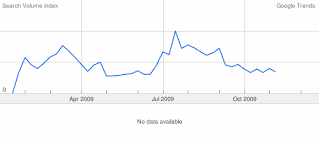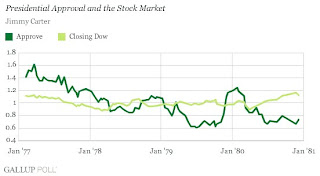“War is seen as a great challenge,” Bueno de Mesquita reflects, “so people don’t really question how we got into it unless it fails. All people like winning. Winning is a good thing. Therefore presidents who defeated the ‘evil enemy’—always demonized—are seen as heroic, and so are known as great presidents. That a president avoided getting into a big war is quickly forgotten.”
The art of economics consists in looking not merely at the immediate hut at the longer effects of any act or policy; it consists in tracing the consequences of that policy not merely for one group but for all groups—Henry Hazlitt
Friday, July 07, 2017
Quote of the Day: Is War What Makes a President 'Great'?
Friday, January 29, 2010
Does President Obama Represent American Politics?
And perhaps for those liberals who'd argue that this all about employment, here is a recent report from Pew Research,
``In fact, the relationship between unemployment and presidential approval varies from crystal clear to murky. Indeed since 1981 there have been a number of times when the ties between changes in joblessness rates and public judgments of the president have been weak or even indiscernible. But the link is strongest when unemployment rises precipitously. And it weakens, or even disappears entirely, when other concerns -- such as national security -- become dominant public issues." (bold highlights mine)
Aside, a stunning come from behind electoral victory in a liberal bailiwick of Massachusetts by Republican Scott Brown, seems to signify a massive symbolical setback to President Obama's programs...
So the answer to the question above appears to be NO!
Friday, November 20, 2009
Popularity Based Politics Equals Waking Up To Frustration
People are made to believe that alleged changes brought forth by a new leadership, rather than changes in the system, is what matters most. Candidates are chosen based on symbolism and the free goodies that they offer.
Little do the public understand, as Rev. Edmund Optiz warned that ``The state being what it is, it matters little who holds office and wields its inordinate powers. This truth is dawning on some persons today; but the general public, however disillusioned with politicians, still has faith in politics as the means of curing all the ills of society and improving the quality of life. Hopefully, people will someday realize that what counts is the overextension of state power, not who holds public office. The important thing is to refute statist ideas, whatever their guise..."
Real life experiences should serve as examples...
In the US, President Obama had been ushered in as the most popular elected president.
And as we noted in US Politics: Extrapolating Hope and Change to Presidential Term Realities, ``Yet high approval ratings tend to be followed by a collapse over the years."
It's barely been a year and as recently noted in President Obama's Popularity Falling Back To Reality, "Americans seem to be waking up to the harsh realities of life".
Hope appears as being interchanged with unmet expectations or frustrations.
Take this Bloomberg report, ``President Barack Obama’s approval rating has fallen below 50 percent for the first time in polling by Quinnipiac University as U.S. voter discontent grows over the war in Afghanistan.
``Obama’s job approval rating fell to 48 percent in the Nov. 9-16 survey of registered voters nationwide by the Hamden, Connecticut-based university, with 42 percent polled saying they disapproved of the job he is doing."
“In politics, symbols matter, and this is not a good symbol for the White House,” Peter Brown, assistant director of the Quinnipiac University Polling Institute, said in a statement."
It's not just in Quinnipiac University but also among major pollsters...


 And even in Google search trends
And even in Google search trendsSo while Wall Street maybe cheering on the recent gains from rising markets, such optimism isn't being translated to the main street.
Our point is: we should realize that economic freedom matters more than delusional popularity contests.
Saturday, August 29, 2009
Tenuous Relationship Between Presidential Approval And Stock Market Returns
We said ``popularity measures seem to be an inaccurate way to evaluate, gauge or predict stockmarket activities, trends or returns. That's because popularity is mostly about superficiality and inherently fickle."
In contrast to certain analysts who say that Presidential approval has important contributions in determining spending and investment choices which gets filtered into the stock market valuations, it would seem to us that the attribution of a causal link, instead, represent as a heuristic or cognitive bias known as "clustering illusions" or the tendency to see patterns where none exists (wikipedia.org).
Gallup's recent article seems to validate our thesis.
Some of the presidential approval-stock market performance correlationship charts per administration during the last two decades...
In conclusion, the Gallup says, (all bold highlights mine)
``In any case, Gallup trends suggest no systematic pattern by which Democratic presidents (who may be viewed on Wall Street as more anti-business than Republicans) find their job approval ratings inversely related to job approval, nor a consistent pattern by which Republican presidents find a positive correlation.
``More generally, from president to president, and from time period to time period within presidencies, the market and job approval ratings have moved in widely varying directions, displaying no systematic relationship."
It's the policies employed that should matter more than simple popularity.
Friday, August 21, 2009
President Obama's Popularity Falling Back To Reality
``Yet high approval ratings tend to be followed by a collapse over the years."
"Change we believe in" appears turning out to be-"the more things change the more they remain the same".
As H.L Mencken presciently wrote of politicians, ``These men, in point of fact, are seldom if ever moved by anything rationally describable as public spirit; there is actually no more public spirit among them than among so many burglars or street-walkers. Their purpose, first, last and all the time, is to promote their private advantage, and to that end, and that end alone, they exercise all the vast powers that are in their hands … Whatever it is they seek, whether security, greater ease, more money or more power, it has to come out of the common stock, and so it diminishes the shares of all other men. Putting a new job-holder to work decreases the wages of every wage-earner in the land … Giving a job-holder more power takes something away from the liberty of all of us .…" (emphasis added)
Americans seem to be waking up to the harsh realities of life.
Yet the higher the expectations, the greater fall.
Although with the rate the above has been going, it doesn't seem to take years-after all it's been only about 7 months!
Thursday, July 23, 2009
Presidential Approval Ratings and Stock Market Returns
 This from Bespoke Invest, (bold highlights mine)
This from Bespoke Invest, (bold highlights mine)``When looking at the complete history of approval ratings, it was hard to believe that even though he left office as one of the most unpopular Presidents ever, at one point George W. Bush's approval rating was higher than any other President in the post-WWII era. Ironically, the prior record appears to be held by his father, whose popularity also hit its lowest levels near the end of his first and only term. Likewise, while Reagan has been viewed positively by both Republicans and Democrats, he and Nixon (and Obama so far) are the only post-WWII Presidents who never saw their approval ratings break above 70%.
``Taking the USA Today's look at Presidential approval ratings one step further, we added a chart of the S&P 500's year over year (y/y) performance during each President's term to see how a President's popularity was tied to the stock market. Not surprisingly, there is a strong relationship between the stock market's performance (which reflects the economy) and how a President is viewed. Presidents who were in office while the stock market was strong typically have been more popular and vice versa."
``In recent history, however, the relationship has been less consistent. For example, George W. Bush's popularity peaked when the market was weak, and as the stock market improved up until 2007, his popularity continued to decline. Likewise, while it's still early in his first term, President Obama came into office with an approval rating of 64%, but even though the markets have shown considerable improvement, his approval rating has seen a decline to 55%."
Think of it, the last paragraph suggests that falling popularity for President Obama has been coincidental with rising stock markets so there seems to be a loose connection.
Aside from the attractively colored chart which are meant to amuse, popularity measures seem to be an inaccurate way to evaluate, gauge or predict stockmarket activities, trends or returns. That's because popularity is mostly about superficiality and inherently fickle.
For instance, a popular president who undertakes populist policies may generate short term gains, but reap long term pains and vice versa.
What seem to matter more is the substance and direction of the policies employed.













 From
From